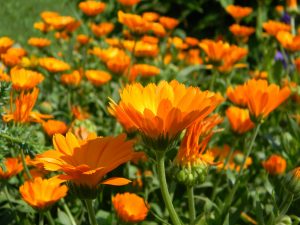Links contained in this post and elsewhere on my website may include affiliate links. When you make a purchase through these links, I earn a commission at no additional cost to you. I only link to products and services that I love - and that I think you will love, too!
Herbs for Women’s Health
It’s pretty easy to turn up information on red raspberry leaf for women’s health (it’s traditionally believed to be a uterine tonic), and also a few oft-repeated “herbs for women” like vitex, black cohosh, and cramp bark. As usual, though, you can go quite a bit deeper than that.
Herbs and Menstruation
Having a period every month can be a pretty terrible fate. I’m just going to put that out there. I know that a lot of my readers celebrate their moon cycles as a time to reconnect with the divine feminine. But. Speaking from my personal experience, even with herbs that support liver health, ease tension in the body associated with menstrual cramping, and restore balanced circulation on days with heavy bleeding, it’s still no walk in the park, and certainly not something I have ever felt like celebrating.
That three pronged approach -supporting liver health, easing physical tension, and restoring balanced circulation- is often an excellent path to explore if you (or a loved one) are very unhappy with their periods. Although it is tempting to try the “this herb for that problem” approach , even better balance can be achieved by looking at the individual. There may be other imbalances that are also contributing to the problem, but these three experiences are pretty common.
Supporting Liver Health
In herbal theory, there are quite a few things that can contribute to a grumpy liver. For a general glimpse into the amazing complexity that is TCM and the Liver, this article is a great start.
Schisandra, peony, and bupleurum are a few examples of herbs that can be especially supportive of the liver for women. Dandelions, burdock, and herbal bitters might also be appropriate.
Calming Tension
There are many different herbs that can help balance tension and associated cramping. Aptly named cramp bark is one traditional choice, but I also very much appreciate passionflower and valerian for this purpose. Chamomile tea is another wonderful (and readily available) herb to investigate.
Balancing Circulation
It can also be helpful to keep a few herbs in mind for balancing circulation. In herbalist-speak, we often think of heavy menstrual bleeding as being part of an indication that the pelvic region is congested. Certain herbs are believed to have an affinity for rebalancing circulation throughout the whole body. Yarrow and cayenne are both examples, with yarrow having a long history of use by women seeking to bring a little more balance to their flow.
Herbs and Pregnancy
There are actually very few herbs that have been proven safe in pregnancy, although there are many that experienced herbalists will tell you are assumed to be or have traditionally been used by women during pregnancy. Rather than give you a comprehensive list (because I haven’t found one if there is one!), I’d like to help point out a few problematic categories and point you toward a few good resources.
Generally speaking, pregnant women should stay away from using very bitter herbs, herbs that have high levels of phytoestrogens (like black cohosh and red clover), and herbs that are emmenagogues (herbs that move the blood; angelica or albizia are examples). Herbs that thin the blood and could increase bleeding are also probably best to avoid.
If you are interested in using herbs during a healthy pregnancy, it’s probably best to seek out an experienced herbalist who can work with you one on one and discuss your plans with your doctor.
Herbalist Aviva Romm has an excellent article on what herbs are safe to use during pregnancy and what’s not. She’s also written several really great books on herbs and pregnancy if you are looking for more information.
Herbs and Menopause
Phytoestrogens are a type of molecule that fit estrogen receptors in the human body yet typically have a much milder effect than our own estrogen. Modern herbalists often suggest using red clover and black cohosh based on this logic.
Common garden sage is another herb that you may want to investigate, as well as making dietary or lifestyle changes that balance Heat and counteract the dryness that’s often associated with menopause. The Herbal Academy has a good overview article (#affiliate) that also includes a tea recipe.
Getting to Know Black Cohosh
Black cohosh is another native Appalachian forest plant that I love very much. It has an elegant flower plume that blooms from mid to late summer, so besides being a useful herb to have in your shade garden it’s also a beautiful landscape plant! Traditionally, black cohosh had a reputation for being a useful woman’s herb, but it was also utilized for pain relief, the nervous system, and as an antispasmodic to balance tension. It was also a common cough syrup ingredient. I’ve included a few links below to help you study up and understand black cohosh a little better – I think you will find that it’s surprisingly versatile!
Appalachian Center for Ethnobotanical Studies has a PDF Monograph that is a wonderful introduction to understanding black cohosh.
The entry on Black Cohosh from The American Eclectic Dispensatory from 1854.
How to grow black cohosh in a woodland garden.
All the best,
Agatha



